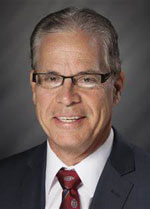By STU CLAMPITT
news@readthereporter.com
Many experts are telling you the banking system is sound, even though the failure of Silicon Valley Bank (SVB) is the second-largest collapse in U.S. history, and that collapse came hand-in-hand with two other major fallouts: Signature Bank in New York and Silvergate in San Diego.
The Reporter reached out to both ReJoyce Financial President and CEO Alexander Joyce and Community First Bank of Indiana’s President and CEO Robb Blume to look for some answers for our readers.
ReJoyce Financial, 881 3rd Ave. SW, Suite 100, Carmel, is a full-service financial planning firm focusing on tax planning, tax filing, estate planning, traditional financial planning and wealth management.

Joyce
“When I first heard it, I was definitely not surprised, and in fact, I think there is a lot more to come,” Joyce told The Reporter. “The biggest reason and how I have been coaching clients is debt. Interest rates and debt are inverse. A lot of banks hold their debt in debt securities. Very little would be secure treasury. What happens when rates and inflation go up is it causes an inverse relationship with debt securities. By definition, rates go up and debt goes down. Bonds are debt.”
Joyce said he has noticed debt securities [bonds] that several years ago were rated AAA have been falling until they have become high risk.
“There is a Fed fund rate and a call rate, and they will call that debt,” Joyce said. “If interest rates go up to a point where it is not affordable anymore, they will just default on it, which is exactly what happened.”
According to Joyce, the debt portfolios for all three banks were heavily invested in corporate debt.
“A lot of this – because rates went up so aggressively and so fast – is a lot of real estate,” Joyce said. “There were a lot of mortgage-backed securities. Especially with variable loans as it’s hiking up, there is not enough money to pay that, so they will default. That’s exactly what’s happening, and I think there’s more to come. I think insurance companies have done it right because they have sleeved out billions of dollars not just in their own holdings, but they have gone to treasuries, so they can follow it a bit more to keep up.”
For all three recent bank failures, there has been much talk about the level of investment each had in the cryptocurrency market. The combination of investing in crypto in a volatile climate and the recent federal funds rate increases contributed heavily to at least one of these banks failing.
Jocye said he sees high financial risk for people who have invested in either crypto or anything with a variable rate right now.
“There is significant risk,” Joyce said. “This is a recession. The definition of a recession is three negative quarters of gross domestic product. We’re there. They didn’t say it was the Great Recession of 2008 and 2009 until it was over. This is history and it’s happening right in front of our eyes. The Fed is fighting inflation with the only thing they have in their holster, which is interest rates. They are going to keep raising rates because it is the only thing they can do to fight this inflation down.
“The issue for individuals with wealth getting ready to retire or who plan to retire in today’s economy is they are going conservative,” Joyce said. “With the inverse relationship between debt securities bonds and the length of maturity, there are two ways debt has risk. Length of maturity, which is going back to the banks. They are out a long time on their duration. So you have duration risk, which in the bond market is really bad, and you have interest rate sensitivity. When you add those two things together, rates go up, bonds go down – you have duration risk and you have default risk. That is what’s happening in our world right now and I think it’s going to get worse.”
Joyce explains that many people who see this happening and don’t want to lose money will shift to bonds.
“If they don’t understand the inverse relationship – again, rates and duration – what happens is as they shift out of equities because they don’t want to lose money, now they’re in something that is losing more money. The biggest issue, just like why the banks default, is they can never get it back.”
Because of Federal Deposit Insurance Corporation (FDIC) guarantees, most people will not lose any of their personal money when a bank fails.
“The federal reserve is going to back that up,” Joyce said. “People are not going to lose their money because the bank fails and the FDIC is going to take over.”
In this instance, there is the issue of a presidential executive order to guarantee deposits that were in excess of the FDIC insurance limit. That is controversial decision that exceeds the capacity of this article because of the eventual cost to taxpayers.
“This is a weird time in our industry,” Joyce said. “What I always say is just make sure you are dealing with the right type of advisor. Number one, get advice. I don’t teach preschool kids, I’m not an architect, I’m not an engineer, I don’t change my own oil, I don’t do my own roofing. I trust somebody. It takes a little time to poke around and put a little trust in the process and hold them accountable from the little bit of knowledge I have of the industry. The same things goes with ours. This is not a do-it-yourself thing. It is far more complex. For people who invest who have this fear, this is no longer, ‘buy some IBM, buy some Apple, buy some Microsoft and let it ride.’ This is not that anymore.”
To make certain your money and your potential investments remain safe not only now, but also in the future, Joyce recommends doing your due diligence not only to know enough about the industry to ask the right questions, but also to ensure you are seeking advice from the right source.
“Just make sure the advisor you have is appropriate for what your expectations and goals are,” Joyce told The Reporter. “Active management is winning the race. This is no longer a passive play when you are losing money on both sides of your portfolio. Not only seek professional advice, but make sure the advisor you are seeking advice from is the right style or the right type of advisor that is best for your current need.”
You can learn more about ReJoyce Financial and contact someone from the the team online at ReJoyceFinancial.com.
Q&A with Community First Bank of Indiana’s President & CEO Robb Blume
To provide a perspective from inside the banking industry, The Reporter reached out to Community First Bank of Indiana about the recent bank failures. President and CEO Robb Blume provided clear and direct answers to all our questions.

Blume
Q: To the best of your knowledge, what caused the Silicon Valley Bank failure?
A: There were several contributing factors to the Silicon Valley Bank failure.
First, the bank’s deposits were highly concentrated in start-up, tech-related, venture capital and crypto-currency related ventures backed by venture capital funds. Their deposit base was highly concentrated in these large depositors, with 93.9 percent of deposits being uninsured.
When rates were low, their customer base was able to access low-cost funding and built large cash balances with the bank. During the same time period, the bank’s management was investing excess funds (funds it was not able to directly loan to borrowers) in longer term Treasury securities and mortgage-backed securities.
When interest rates increased, capital became scarce and depositors began making large withdrawals from the bank. The large volume of withdrawals necessitated the bank liquidate those longer-term investments, resulting in approximately $1.8 billion in losses to the bank. This resulted in bank regulators shutting down the bank.
Q: And what about Signature Bank in New York and Silvergate in San Diego?
A: The Signature Bank failure had some similarities to Silicon Valley Bank, in that it was a “crypto-centric” bank, with high concentrations of deposits, resulting in a high level of uninsured deposits (89.7 percent).
When news of the SVB failure became known, large depositors of Signature Bank began to move deposits to larger financial institutions, with over $10 billion being withdrawn on Friday. This led to a Sunday shutdown of the bank by regulators.
Silvergate, which is being classified as an orderly wind down, was the first of the three banks to signal problems when it announced its orderly wind down. Silvergate was also very concentrated in the crypto industry.
Q: Should the cryptocurrency market or the Federal Reserve’s recent interest rate increases be a concern for your bank or your customers?
A: In the case of Community First Bank of Indiana, our funds are used to fund primarily loans to small business, homeowners and consumers. Our investments in treasuries and mortgage-backed securities total less than 1.5 percent of our asset base, so our exposure to the unrealized losses suffered by Silicon Valley Bank are extremely limited and should not be of concern to our customers.
Q: What happens when a bank fails?
A: The answer to that depends greatly on regulators. In the case of both Signature Bank and Silicon Valley Bank, the regulators have indicated that all depositors will receive 100 percent of their funds, although possibly with some delay.
Frequently, the FDIC will work to find a purchaser of a failed bank, resulting in continued operations. In the case of a wind down, such as Silvergate, the plan would be to sell off assets, such as loans, investments and real estate. Funds raised from those sales would be used to pay depositors and creditors, with the bank ceasing to exist once assets are sold and liabilities paid.
Q: What happens to someone’s money when a bank fails?
A: Once again, the answer to this question depends greatly on actions taken by the regulators. If they elect to protect all deposits, as they have done in the cases of SVB and Signature, then depositors recoup 100 percent of their funds. If another institution purchases the failed bank, they may elect to make the depositors whole, as well. In rare instances, uninsured deposits may be lost or only partially repaid.
Q: What can our readers do to help protect their money from bank failures?
A: First, don’t panic. The current situation is not reflective of the overall strength of the banking industry. Across the board, banks of all sizes remain healthy and well capitalized. The three banks currently in the news, with their high deposit concentrations and focus on tech and crypto, had business models far, far different than community banks in the Midwest.
In the case of SVB, the need to liquidate long-term securities investments created a huge loss. In my estimation the chances of these circumstances occurring in a large number of community banks is extremely unlikely.
Don’t be afraid to ask questions of your bank. Ask about deposit concentrations, the level of uninsured deposits, liquidity planning and levels of long-term securities investments.
Q: Are any of the factors that contributed to the recent bank failures likely to place your institution or your customers in a difficult position? Why or why not?
A: There are not. About the only thing Community First Bank of Indiana has in common with the three banks being discussed is that the word “bank” is in our title.
We do not have any investments in cryptocurrency, nor do we facilitate crypto trades or warehousing for any of our customers. Our deposit base is highly diversified, with our uninsured deposits being less than 15 percent of total deposits. Our investment portfolio is relatively low, limiting our interest rate risk in that area.
I believe that the greatest risks presented to community banks by the current situation are continued focus on the three “outliers” that have experienced difficulties and the possibility of increased regulation on smaller banks.
You can learn more about Community First Bank of Indiana and find a branch near you online at CFBIndiana.com.
Sen. Braun: “Hoosiers and responsible community banks should not be on the hook for bailing out Silicon Valley Bank”

Braun
Senator Mike Braun released the following statement on protecting Hoosiers and Indiana’s community banks from bearing the costs of the Biden Administration’s bailout for Silicon Valley Bank.
“Community banks and their customers in Indiana should not be on the hook for bailing out Silicon Valley Bank and Signature Bank for their risky financial decisions,” Sen. Braun said. “President Biden created this chaos with his inflation bomb spending agenda, and now he wants Hoosiers to pay for his coastal elite bailout through increased fees at their banks. I’m exploring legislative actions to make sure the costs of this bailout don’t get passed onto regular Americans.”
Our newsgathering partners at WISH-TV Channel 8 have in interview about Braun’s stance on preventing community banks from paying for a bailout. You can read their story at this link.

